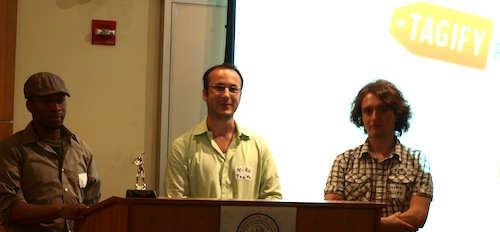One eyebrow-raising moment at last night’s Hoboken Tech Meetup was when former Huffington Post CEO Eric Hippeau said that in his new gig at Lerer Ventures, he funds one company per week.
It is a good time to be a startup. Or at least the kind of startup that Lerer Ventures is interested in—those with founders that want to take on huge markets.
Hippeau has led a charmed and fascinating life. This Sorbonne-educated but very worldly media entrepreneur worked his way up from running an English language paper in Brazil (when he was just 20) to taking the CEO helm at giant tech publisher Ziff-Davis.
As you might expect, his presentation on the disruptive power of software was backed up by interesting stories. Like the time he was working at Softbank trying to convince Jerry Yang, who had a company called Yahoo, to take a $100 million investment.
Nowadays, if you have a good idea, great team, and the timing is right, Lerer Ventures will provide the seed money. Less than $100 million, no doubt, but their deal flow in angel-sized investments is impressive.
And I like their taste in media-centric startups.
On the Lerer site, they’ve listed investments in Food 52, my favorite foodie resource, Pulse, the eye-catching news aggregation service, and SeatGeek, which searches for sold-out sporting and concert tickets.
Another interesting aside made by Hippeau during his talk is that journalists and writers make very good investors, mostly because of their curiosity. I’ll file that away for when I’m looking for a new career.
It was a little ironic to hear Hippeau, who was born in France, talk about the lack of entrepreneurship and overall stodginess in his native country in the late 1960s and all the way up to the present. Mais bien sûr, entrepreneur is a French word literally meaning to take in hand.

Tagify’s global team
You know what he was getting at. America is a leader in business startups, and brought out the best in this French-born citizen of the world.
But the global community is catching up, startup-wise.
Hippeau had positive things to say about the tech scene in Shanghai, Brazil, and even in his native France. And in his days at Huffington Post, he was dependent on a world-wide team of developers that stretched from Sao Paolo to the Ukraine.
The international nature of the startup ecosystem was on display during the demo segment at HTM.
Tagify, a social tagging app which took first place at Startup Weekend last month, counts as founders Niko Pipaloff from Bulgaria and Justas Janauskas, a Lithuanian. Besides being the tech brains in this crew, Justas also has his own profitable business in Europe.
Another demo I saw last night that I thought was positively brilliant comes from a company called Authy, as in authentication.
Authy provides a cheap substitute for authenticating users by employing an iPhone-based password generator rather than using that proprietary and expensive RSA thingie. If you’re at a Fortune 500 then the RSA approach, which starts at $100k, is probably the way to go.
For small companies that need to secure there cloud-based apps, Authy has a truly cost-effective service that will start at around $10 per month.
Anyway, the HTM attendees were informed that one of the Authy co-founders, Dan Palacio, couldn’t make it because he was in Columbia Col-om-bia (the country, not the uptown university) looking for engineers.
Point taken by Hippeau: software and I might add telecom has disrupted business creation on a planetary scale.
Other demos I liked last night: Onepager, a straightforward web site generator for small businesses, and smarketplaces, which provides a peer-to-peer buying widget that’s especially suited for blogs that have a strong topic focus.
I’m definitely going to look into that last one.
Related articles
- TechCrunch Disrupt: The Secret to Entrepreneurial Success (technoverseblog.com)
- Tagify Plans to Mature Before Seeking Investors (nyconvergence.com)
- Lerer Ventures
- Onepager
- smarketplaces
- Tagify



Nice summary. HTM and Aaron Price are great Hoboken (and tech) resources.
Suspect that the search is happening Colombia, the country, not Columbia, the university.